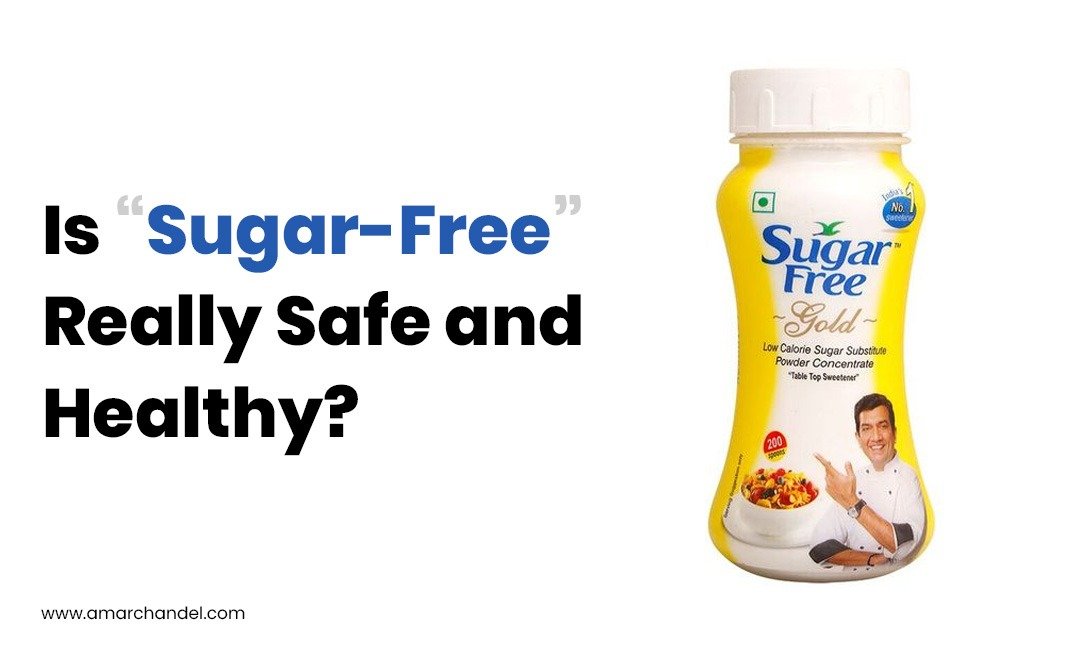- Is “Sugar-Free” Really Safe and Healthy?
Short Answer: Not necessarily. It depends on what is being used in place of sugar.
Most “sugar-free” products use artificial or synthetic sweeteners like:
• Aspartame
• Sucralose (Splenda)
• Saccharin
• Acesulfame-K
Or sugar alcohols like:
• Sorbitol
• Xylitol
• Erythritol
The Reality:
• These sweeteners can reduce calories, but studies suggest they may disrupt gut microbiota, increase sugar cravings, and cause glucose intolerance in the long run.
• Some (like aspartame) have been controversially linked to headaches, mood swings, or even neurological concerns in susceptible people.
• Erythritol has recently come under scrutiny for potential cardiovascular risks when consumed regularly in high quantities.
So while “sugar-free” feels like a healthier choice, it often simply swaps one problem for another.
- Is Sugar Itself Bad, or Is It the Quantity That’s the Problem?
Short Answer: Both — but quantity is the main culprit.
Processed White Sugar:
• Has zero nutrition — only empty calories.
• Is rapidly absorbed, causing insulin spikes, contributing to obesity, Type 2 diabetes, inflammation, and even mood disorders.
But the body does need some glucose for energy — just not in the amounts we currently consume. And what the body needs by way of glucose should come from fruit, not man-made sugar.
The Bigger Issue:
• We are consuming far too much sugar (often hidden).
• The WHO recommends no more than 6 teaspoons per day (approx. 24 grams) for adults. That is the upper limit. The lesser the better. And you cannot take 12 tsp today just because you didn’t have any yesterday!
• The average Indian urban adult consumes ~20–25 teaspoons daily, often without realising it — from tea, snacks, packaged food, soft drinks, ketchup, bread, etc.
So it’s the overdose, more than the sugar itself, that is toxic.

- How Good or Bad is Gud (गुड़ / Jaggery)?
Short Answer: Jaggery is better than white sugar, but still not something you should consume freely.
The Good:
• Unrefined, often made with minimal processing.
• Contains trace minerals like iron, magnesium, and potassium.
• Traditional Ayurveda recommends it (in moderation) as a digestive aid, especially in winter.
• Doesn’t cause as sharp an insulin spike as white sugar.
The Not-So-Good:
• Still high in calories and sugar (sucrose content is about 65–85%).
• Will still raise blood sugar, though more slowly.
• Overuse can still lead to weight gain, diabetes, and fatty liver if consumed daily or in excess.
Use it as a medicinal sweetener, not a daily staple. A little post-meal or with herbal tea is fine for most healthy individuals.
Top Natural Sugar Alternatives (Healthier Options)
- Stevia (Natural Leaf Extract)
• Glycemic Index: 0
• Calories: Zero
• Safe for Diabetics? Yes
• Pros:
• Comes from a natural plant.
• Doesn’t spike blood sugar.
• Heat-stable (can be used in cooking/baking).
• Cons:
• Some people find the taste slightly bitter or metallic.
• Use only the pure leaf extract or green powder — not the white processed crystals (those are often mixed with erythritol or maltodextrin).
Best for diabetics and calorie control.
- Dates (Khajur)
• GI: 42–55 (low to moderate)
• Calories: High, but nutrient-dense
• Safe for Diabetics? In moderation
• Pros:
• High in fibre, potassium, and magnesium.
• Natural caramel-like sweetness.
• Antioxidant-rich.
• Cons:
• High natural sugar content — don’t overconsume.
Use in smoothies, desserts, or date paste as a sugar replacement.

- Raw Honey (शहद)
• GI: 35–60 (varies by type)
• Safe for Diabetics? In small quantities only
• Pros:
• Antimicrobial and antioxidant properties.
• Contains trace enzymes, pollen, and vitamins.
• Ayurveda’s preferred sweetener (used correctly).
• Cons:
• Calorific.
• Many commercial honeys are adulterated or boiled (destroying nutrients).
Use raw, unfiltered, organic honey — never heat it, as Ayurveda warns against it.
- Coconut Sugar
• GI: ~35
• Safe for Diabetics? Better than sugar, but still a sugar
• Pros:
• Contains trace minerals (zinc, iron).
• Less refined than white sugar.
• Cons:
• Still high in fructose/sucrose.
Good for baking; tastes like brown sugar.
- Mishri (Rock Sugar / मिश्री)
• GI: High (~65+)
• Safe for Diabetics? No
• Pros:
• Often used in Ayurveda with fennel to aid digestion.
• Less chemical processing than refined sugar.
• Cons:
• Still sugar — don’t treat it as harmless.
Use sparingly, as a mouth freshener or digestive.
Smart Usage Tips:
• Use whole-food sweeteners (like dates, fruit purées, honey) instead of refined ones.
• Reduce your sweet tolerance gradually — this resets your palate.
• Always check labels of “sugar-free” or “diet” products — they often contain hidden harmful sweeteners.
• Don’t combine multiple sweeteners — the body still counts them all.

